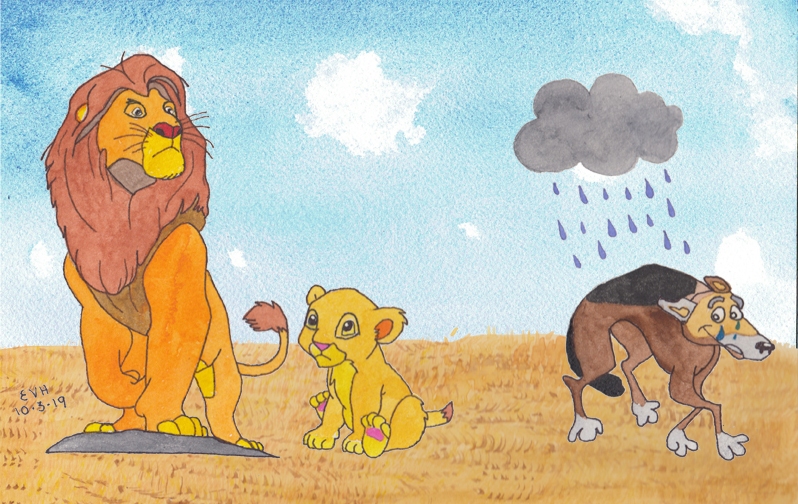
Jataka 172
Daddara Jātaka
The Jackal’s Roar
as told by Eric Van Horn
originally translated by William Henry Denham Rouse, Cambridge University
originally edited by Professor Edward Byles Cowell, Cambridge University
This story gives an interesting insight into early Buddhist practice. In it we see that in the evening elder monks and presumably nuns as well recite one or more discourses. (This is probably how the other monastics learned them.) In the story in the present we find a monk who wants to among those respected elders, but predictably he falls short.
In the story from the past we once again find the poor jackal as the foil of the story.
The “lion’s roar” is a metaphor used throughout the Pāli Canon for the Buddha’s teaching, and also for important events such as someone attaining awakening. If you have ever heard a lion roar, you know how the earth shakes. I was in a zoo once when a lion roared, and the whole zoo went silent, animals and people alike. That experience really brought this metaphor to life for me!
“Who is it with a mighty cry?” The Master told this story while he was at Jetavana. It is about one Kokālika. At this time we hear that there were a number of very learned monks in the district of Manosilā. They spoke out like young lions. When they recited the discourses before the Saṇgha they were loud enough to bring down the heavenly Ganges (Milky Way).
As they recited their texts, Kokālika - not knowing what an empty fool he would show himself to be - thought he would also like to recite the discourses. So he went among the monks saying, “They don't ask me to recite a discourse. If they were to ask me, I would do it.”
The whole Saṇgha got to know about this and they thought they would give him a chance. “Friend Kokālika,” they said, “recite some discourses today for the Saṇgha.” He agreed to this, not knowing his folly. That day he would recite before the monastic community.
First he found some gruel made to his liking, he ate it, and he had some of his favorite soup. At sundown the gong sounded for the recitation time. The whole community gathered together. The robe that he put on was as blue as a bluebell. His outer robe was pure white. Dressed in this way he entered the meeting. He greeted the Elders and stepped up to a Teaching Seat under a grand jeweled pavilion. He held an elegantly carved fan. He sat down, ready to begin his recitation. But just at that moment beads of sweat began to pour out all over him, and he felt ashamed. He was able to recite the first stanza, but then he could not remember what came next. So rising from the seat in confusion, he left the meeting and went to his cell. Someone else, a real scholar, recited the discourse. After that all the monastics knew how empty he was.
One day the monastics started talking about this in the Dharma Hall. “Friend, it was not easy to see before how empty Kokālika is. But now through his own efforts he has shown it.” The Master entered and asked what they were discussing. They told him. He said, “Brothers and Sisters, this is not the first time Kokālika has betrayed himself by his own voice. The very same thing happened before.” And then he told them this story from the past.
Once upon a time, when Brahmadatta was reigning in Benares, the Bodhisatta was born as a young lion. He was the king of many lions. He lived with a pride of lions in Silver Cave. Nearby there was a jackal who lived in another cave.
One day, after a rain shower, all the lions were together at the entrance of their leader’s cave. They roared loudly and jumped about playfully as lions do. As they were roaring and playing, the jackal too lifted up his voice. “Here’s this jackal who is trying to roar with us!” the lions said. They felt embarrassed for the jackal and went silent. When they all fell silent, the Bodhisatta’s cub asked him this question. “Father, all these lions that were roaring and playing have fallen silent for very shame on hearing the jackal. What creature betrays himself in this way?” and he repeated the first stanza:
“Who is it with a mighty try makes the meager sound?
Who is it, Lord of Beasts? and why has he no welcome found?”
At his son’s words the old lion repeated the second stanza:
“The jackal, of all beasts most vile, it is he that makes that sound.
The lions loathe his baseness, so they sit in silence round.”

Figure: The Embarrassed Jackal
“Brothers and Sisters,” the Master added, “this is not the first time Kokālika has betrayed himself by his voice. It was just the same before.” And bringing his discourse to an end, he identified the birth: “At that time Kokālika was the jackal, Rāhula was the young lion, and I was the lion king.”
